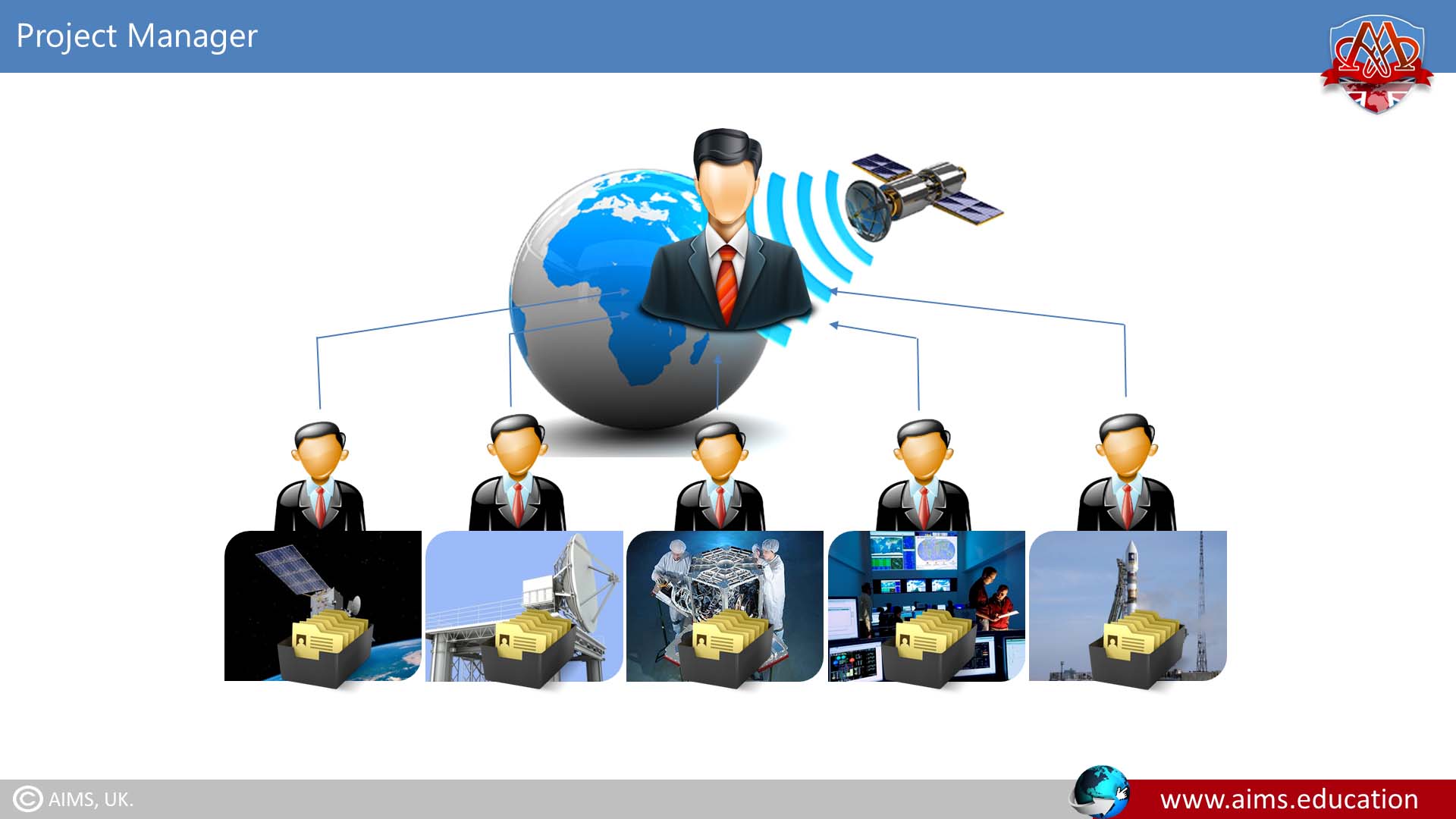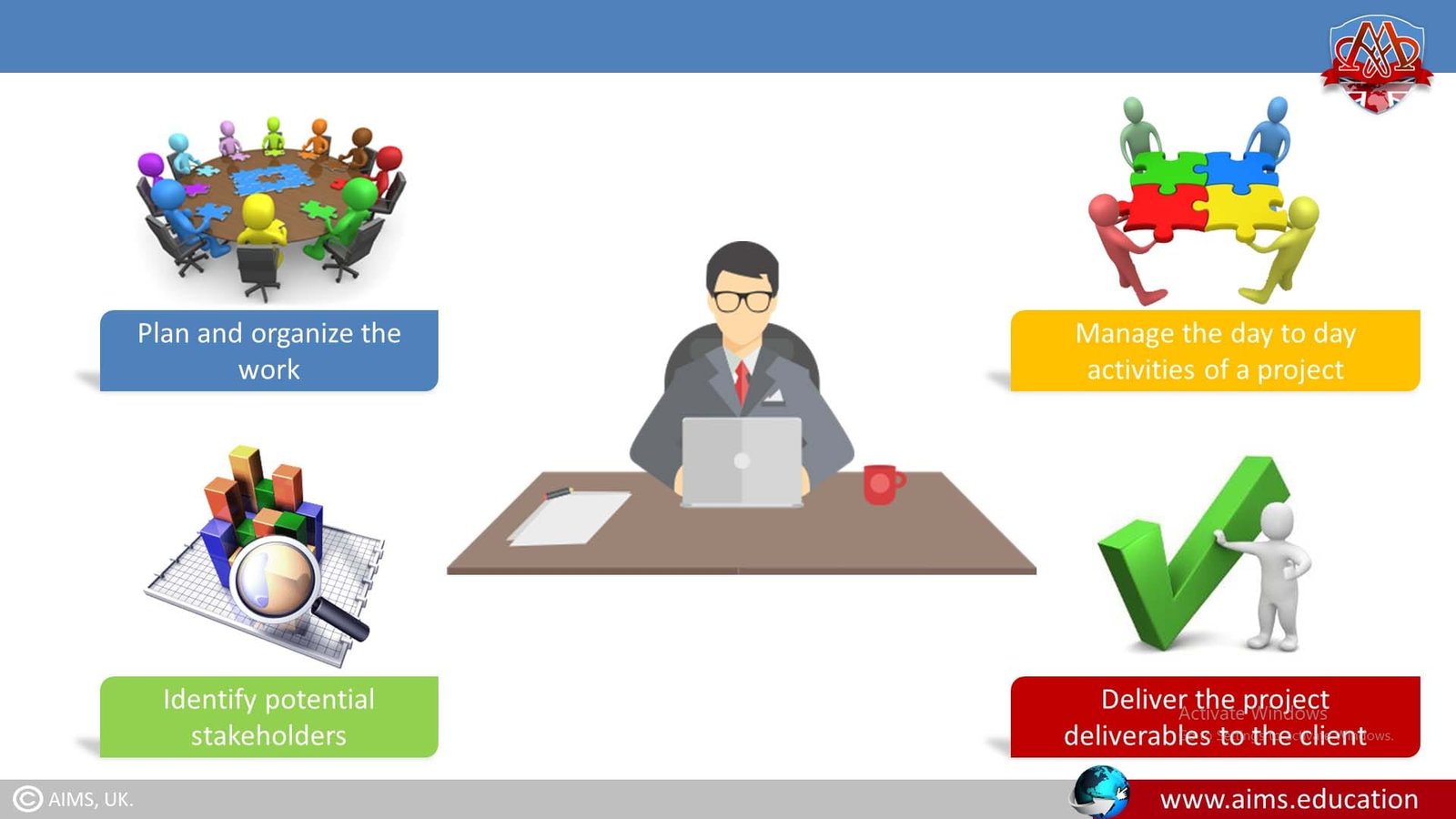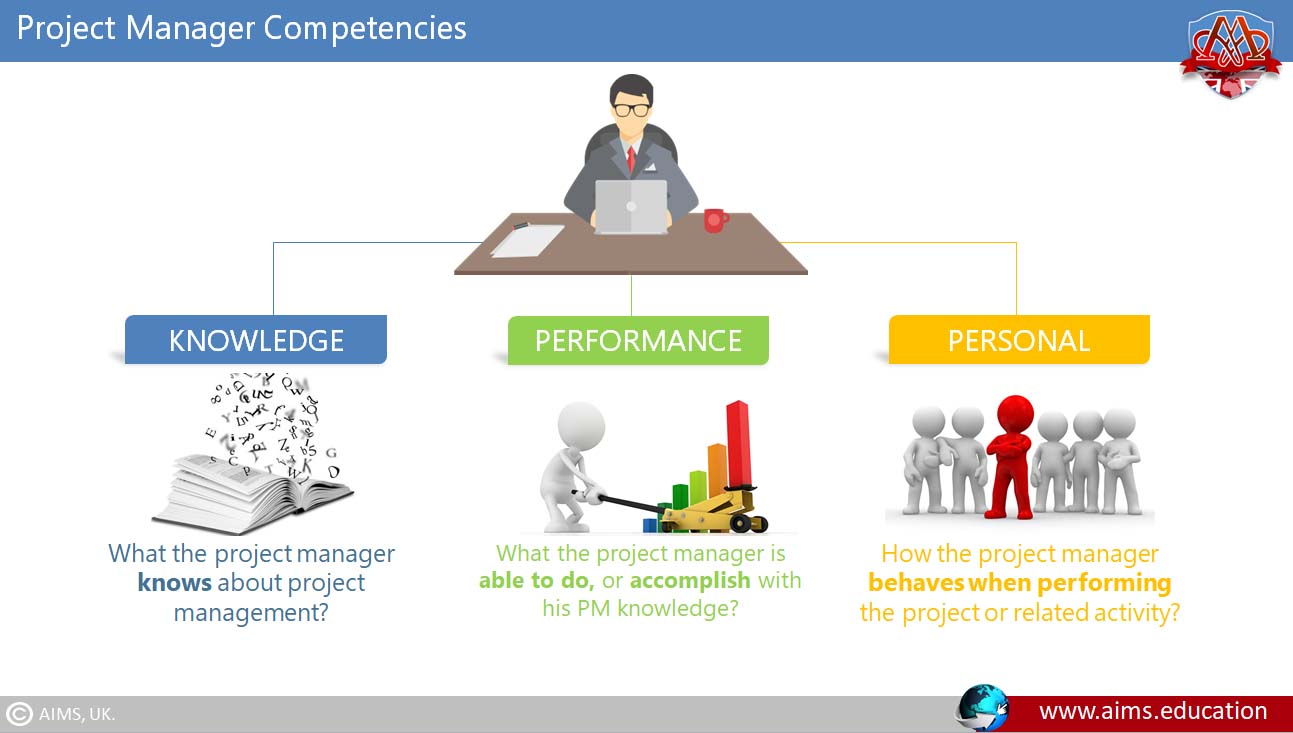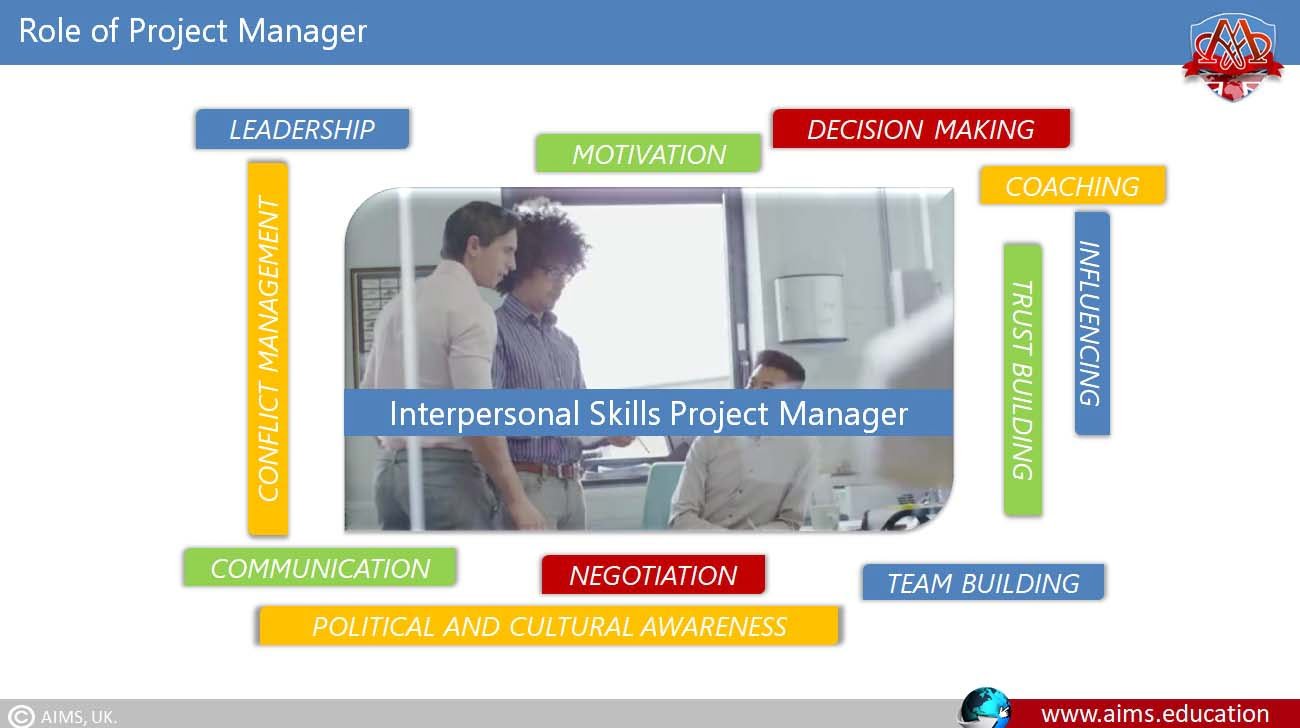What is Project Manager?
The project Manager is a person who is assigned to lead the team by an organization, and that organization makes him responsible for achieving the project objectives. Project manager responsibilities are to manage project processes and apply the necessary tools and techniques to carry out the related project activities. For good project management, various interpersonal, professional, and managerial skills are needed. In general, a project manager roles and responsibilities are to keep the project working within the given time frame, ensure that the job is completed on time, remain within budget, manage project resources, and ensure the required outcomes are met.
Role of Project Manager: More Than Just Assignment
The project manager’s position is much more complex and critical than you might think. His or her job is often perceived as simply designating responsibilities within the team. In reality, the project manager serves as a leader during a project and a central hub for communication for all parties involved in the operation. They are responsible for setting goals, creating a constructive plan, and ensuring all team members are on the same page.
Key Project Manager Responsibilities is Successful Project Delivery
The success of a large, long-term, complicated project requires the experience and knowledge of those in charge, including the project manager. Project managers are silent partners who will turn abstract ideas into excellent results. They will juggle time, costs, and opportunities for a successful finished project. One may ask:
- How do successful project managers portray themselves as a contributing force encouraging a project to reach a positive completion?
Effective project manager responsibilities are to possess the following competencies:
- Knowledge — Refers to what he knows about project management.
- Performance — Refers to what he is able to do or accomplish while applying his or her project management knowledge.
- Personal — Refers to how someone behaves when performing a project or related activity. Personal effectiveness encompasses attitudes, core personality characteristics, and leadership, which provides the ability to guide the project team while achieving project objectives and balancing the project constraints.
Interpreting Project Manager Roles and Responsibilities
During business ventures, project managers are unrelenting, offering a clear path through twists and turns created by the project’s execution. Those who work with project managers know all too well their roles stretch far beyond planning and directing operations.
1. Starting a New Project
Starting a new project is like facing the unknown. The team on the project will look to their project manager for guidance and inspiration. They epitomize the vision and goals of the project, present clear expectations, and push the team to excel.
2. Project Managers are Designers of the Plan
The project managers are the designers of the project’s blueprint. They carefully draft the plans that represent the objectives, scope, and resources needed. The managers create a roadmap that capitalizes on the team’s strengths while reducing possible risks.
3. Project Managers Are Skillful Jugglers
One of the project manager’s roles is to give the vision and skills of a master planner to the team to ensure the project will move forward toward its objective.
4. Best Communication
Communication is the sound that drives a project to its intended completion. The project manager must orchestrate diverse voices whether team members, stakeholders, or clients, to guarantee all voices are on the same page.
5. Guardians Against Adversity
All projects are loaded with issues that can flatten a project in a heartbeat. The project manager responsibilities include keeping an eye out for any problems and quickly rectifying the situation while safeguarding the project’s path.

16 Essential Project Manager Responsibilities
Project manager ensures that the project is completed on time. Whether they are a long-term project manager or new to the role, it’s critical to understand and embrace the endless roles and responsibilities that come with the title. Here are the 16 project manager responsibilities that are an essential part of a project management:
1. Defining Project Scope
The most important responsibility is setting project management objectives. The project’s success highly depends on the project scope management. Use the SMART goal criteria – specific ensures that objectives are clearly defined and offer a solid foundation to build on.
2. Planning and Scheduling
Without an extensive plan, the most creative team can fail. The role of a project manager is to create a roadmap and project initiation plan that includes a timeline and identifies important milestones and dependencies. Right project management software can be a lifesaver. They can check its progress and perform any needed adjustments.
3. Project Stakeholder Management
A great project manager must be able to manage internal as well as external stakeholders. They must form good relationships through communication, listening, and handling different personalities and their interests. Making stakeholders feel they are valuable contributors, can increase the success of the project.
4. Project Resource Management
The project manager must assign resources whether human, financial, or time. There are task management tools and software for the effective distribution of work and keeping track of resources to prevent bottlenecking. This involves assigning jobs and understanding each team member’s strengths and resources for excellent performance.
5. Project Risk Management
Identifying and relieving risks will ensure the project does not go off the track. The project manager must be able to anticipate problems. Have regular risk assessment sessions in the project and continually update the risk to prevent new problems from surfacing.
6. Project Cost Management
Many times, projects are held back due to financial issues, The project manager must keep an eye out on spending. Using cost-tracking tools and creating a good budget that will be reviewed can prevent unexpected financial issues. Project cost management is not just for cutting corners; it’s guaranteeing that the funds are being used where they count.

7. Team Leadership
The project manager’s job is to guide and inspire the team. The roles and responsibilities of the project manager include developing a positive team that honors winning and learns from their losses. Check-ins and team building on a regular basis build high morale even when dealing with challenges, deadlines, or unexpected problems.
8. Supervise and Report
The project manager responsibilities include keep tracking of the project’s progression and constantly watching out for potential issues before they turn into serious problems. Having a structured reporting system with key performance indicators and milestones will allow stakeholders to understand all activities clearly. It will also allow for transparency and for making informed decisions.
9. Solving Problems
Problems are inevitable in any project but how they are handled can decide if they will be a negative situation or a positive outcome. Creating strong problem-solving plans that include quick escalation procedures and clear obligations. There will be a faster resolution and a smoother operation.
10. Project Quality Management
A good project manager should be highly skilled in quality management for project management, and know that quality should be in place every inch of the way. He or she must establish concise quality standards and ensure they are met at every critical point.
11. Change Management in Projects
Projects rarely go as planned, and changes are imminent and necessary. A good project manager must be flexible and will back any change management in project. They must understand there might be changes that must be communicated to the team. They must guide the project through any changes with very little disruption.
12. Project Communication Management
A project manager must possess excellent communication skills. Effective communication can guarantee no one is left in the cold and will prevent misunderstandings that could harm the project. Communication can be through emails, team meetings, or on a one-on-one basis. All avenues must be used for the best results.

13. Client Relations Management
The project manager responsibilities include being the primary contact for the client to nurture and sustain a great partnership. Regularly collecting feedback and understanding expectations can go a long way in ensuring the client will always be a satisfied partner.
14. Project Documentation
Documentation is often overlooked when trying to meet deadlines, but it’s also a critical part of the operation. Clear and updated documentation covers the progress of the project; any changes, decisions, and insight can provide a clear view into the project management methodologies and life-cycle for future reference.
15. Professional Development
The role of project manager should not remain dormant in their knowledge and skills. Constant professional development guarantees they are on top of everything and will adapt to changes within the industry or best practices. Project managers should attend webinars, workshops, and mentorship events to expand their experience.
16. Celebrate Success
Once the project is done, not only will the team get a much-needed rest, but it’s an opportunity to celebrate. The success of the project and the hard work performed by the team will bond people together. Thinking about what went well and what could use some work for the next project is sharing some insight with the team.
Focusing on the project manager responsibilities and roles will increase his or her effectiveness as a project manager and can improve an environment for projects and teams to excel in the future.

Examples of Project Manager Responsibilities
Project manager responsibilities come to life with real-world experiences and when they get involved in complex projects.
1. High-profile Tech Triumphs
- Alex is a project manager at a company where he launched a groundbreaking approach.
- He inspired his team to remain flexible to meet the demands placed upon them.
2. Building the Future, Brick by Brick
- Nichole completed a huge construction development under budget and ahead of schedule.
- She used her skills to foresee potential issues. There were no delays in the timeline.
3. The Heart of Nonprofit Endeavors
- David formed a massive event bringing in thousands of participants.
- His exceptional communication skills united volunteers and sponsors with a lasting impact.

Responsibility Matrix in Project Management
The project management roles and responsibilities matrix is a vital framework that outlines allocating tasks and duties across project teams. Here are the key components of this tool:
1. RACI Model:
This project manager responsibilities matrix assigns clear roles to team members through four categories:
- Responsible,
- Accountable,
- Consulted, and
- Informed.
It is pivotal for delineating the hierarchies of accountability and ensuring that no task falls through the cracks.
2. CAIRO Model:
An extension of RACI, CAIRO introduces two additional elements:
- Omitted (those intentionally left out of a task or decision) and
- Out of the loop (those not needing updates on progress or decisions).
This variant fosters a streamlined focus and eliminates unnecessary informational clutter.
3. DACI Decision-Making Framework
This is a compact approach in which the following roles prescribe a clear pathway for decision-making:
- Driver,
- Approver, and
- Contributors.
4. PACSI Model:
This model focuses on five roles:
- Perform,
- Account,
- Control,
- Suggest,
- Inform.
It offers a detailed governance structure and ties project outcomes to individual contributions.
Project manager responsibilities involve blending structured methodologies with strategic insight and creativity. This approach fosters a productive and cooperative work atmosphere, essential for the success of any team endeavor.
Achieving Project Manager of Project Manager Expertise
AIMS provides advanced project management qualifications and hands-on expertise for project management at all levels:
- MBA in Project Management gleaned through distance learning provides a profound understanding of working on higher and more complex projects.
- Obtaining a Project Management Certificate from AIMS standardizes proficiency in managing project manager responsibilities in agile project management, traditional, and agile waterfall hybrid methodologies.
Frequently Asked Questions
Q1: What does a project manager do day to day?
They set goals, plan schedules, align stakeholders, assign resources, manage risks and costs, monitor KPIs, and ensure deliverables meet quality standards.
Q2: How do you define the scope of a project effectively?
Use SMART objectives, state inclusions and exclusions, list assumptions and constraints, and confirm scope with stakeholders before baselining plans.
Q3: What are the core roles and responsibilities of a project manager?
Scope definition, planning, stakeholder and resource management, risk and cost control, quality assurance, change control, reporting, and team leadership.
Q4: How should a project manager plan and schedule work?
Create a milestone-driven roadmap with dependencies, track progress in software, update frequently, and escalate slippage early.
Q5: What is effective stakeholder management?
Map influence and interest, communicate regularly, gather feedback, set expectations, and include the right people in decisions.
Q6: How do project managers manage risks proactively?
Run periodic risk reviews, assign owners and responses, monitor triggers, and adjust mitigations as the project evolves.
Q7: What does good project cost management look like?
Baseline the budget, track actuals vs plan, analyze variances, reforecast as needed, and prioritize spend on value-critical work.
Q8: How is quality assured in projects?
Define acceptance criteria, build quality into processes, review deliverables at stage gates, and fix defects early.
Q9: What frameworks help clarify project roles?
RACI, CAIRO, DACI, and PACSI help define accountability, decision rights, and communication expectations.
Q10: How should a project manager handle change requests?
Assess impacts on scope, schedule, cost, and risk; seek approval via the change process; update baselines; and notify all stakeholders.
Q11: What communication practices keep teams aligned?
Use a consistent cadence of status meetings, concise reports, one-to-ones, and a single source of truth for documents and decisions.
Q12: Why reflect and celebrate at project close?
Celebration boosts morale, and lessons-learned capture drives continuous improvement for future projects.
